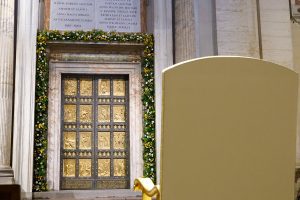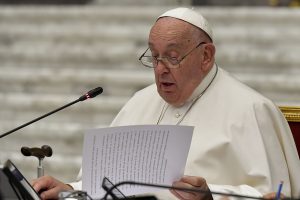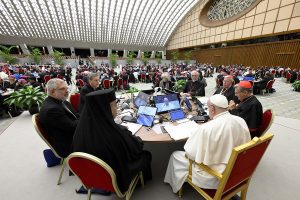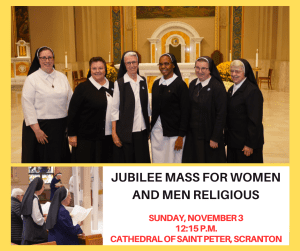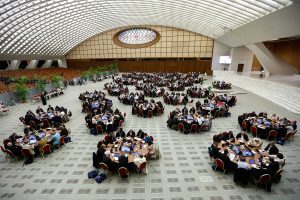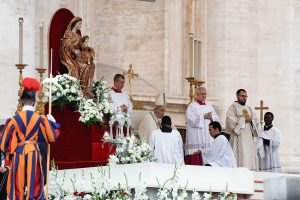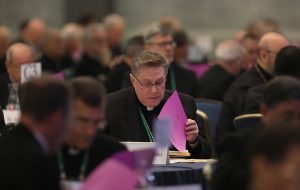VATICAN CITY (CNS) – Highlighting progress made in safeguarding and recommendations for rectifying ongoing gaps, the Pontifical Commission for the Protection of Minors dedicated its first annual report to all victims and survivors of sexual abuse by members of the Catholic Church.
“The commission’s work — including this report — is and always has been about recognition and inclusion of victims and survivors of abuse in the life of the church,” Cardinal Sean P. O’Malley, president of the pontifical commission, said at a news conference at the Vatican Oct. 29.
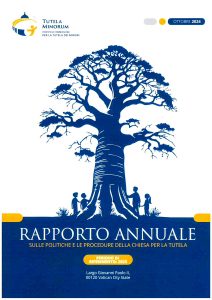
“Your suffering and wounds have opened our eyes to the fact that as a church we have failed to care for victims, and that we didn’t defend you, and that we resisted understanding you when you needed us most,” he said.
“We praise your courageous testimony, and at the same time, we recognize that you are likely tired of empty words,” the cardinal said. “Nothing we do will ever be enough to fully repair what has happened, but we hope that this report and those that will come, compiled with the help of victims and survivors at the center, will help to ensure the firm commitment that these events never happen again in the church.”
The cardinal and other members of the commission presented their pilot annual report, a tool mandated by Pope Francis to measure and document the church’s progress in safeguarding minors and vulnerable adults around the world.
“The pilot report is not intended as an audit of the incidence of abuse within church contexts,” the report said. “This is especially due to time and capacity constraints” and “to a lack of reliable data in some countries, most notably reliable statistics on the number of children who are sexually abused.”
“Hopefully, future reports will address the incidence of abuse, including the question of progress in reducing and preventing abuse,” which might better fulfill “the long-term auditing function of the commission,” it said.
The 100-page report produced detailed “profiles” covering about two dozen church entities.
The commission compiled information about safeguarding received from the about 17 bishops’ conferences whose members visited Rome for their “ad limina” visits in 2023, and it also sent questionnaires, reviewed safeguarding guidelines and exchanged information with: the Consolata Missionary Sisters and the Spiritan priests and brothers; the dicasteries for the Doctrine of the Faith and Clergy; Caritas Internationalis, the Vatican-based confederation of the church’s humanitarian agencies; and three other Caritas entities — one each at the regional, national and diocesan levels.
The report also collected information and “trends” from the commission’s four regional groups of local experts. Among the positive global trends the groups noted are greater collaboration between bishops’ and religious conferences in safeguarding and a shift toward understanding safeguarding is about protecting human rights and dignity.
Some global “challenges” the groups found included: long delays in processing abuse cases by the Dicastery for the Doctrine of the Faith; lack of resources for safeguarding training; clericalism and prioritizing the church’s reputation over supporting victims and survivors; lack of effective measures in current safeguarding activities to address abuse online; and inadequate formation to help clergy in understanding and promoting safeguarding.
“While some serious studies of abuse prevalence have been conducted in local churches” in Europe, “there remains a persistent absence of reliable statistics about the scale of abuse by clerics and religious in several parts of the region,” the report said.
In fact, the lack of data or the inability to access available data on sexual abuse by members of the church, it said, is a major hindrance to the empirical-based approach the commission depends on for formulating recommendations and strengthening policies.
Data is what helps the commission track “which initiatives are working and those that are falling short,” Cardinal O’Malley wrote in the report. By compiling progress made and gaps to fill, the commission aims to promote transparency and accountability, “and be a sign of our commitment to restore the hope and trust of victims,” their families and communities.
The commission expects the bulk of each year’s report to be based on the information it manages to receive — as not all diocesan bishops responded to the commission’s questionnaire — from bishops ahead of and during their ad limina visits to Rome. It will also canvas other dicasteries, religious institutes and lay Catholic associations to be included each year.
The commission’s report proposed seven key areas for further study and action, emphasizing that its staff and experts were available to help all levels of the church.
Among the top priorities, the report said is: “access to the truth,” especially for victims wanting information about their allegations of abuse and the status of their alleged abuser; a clear, uniform definition of what constitutes a “vulnerable adult”; a shared protocol that clarifies the different responsibilities of dicasteries in the Roman Curia and of the local church; “the need for a disciplinary or administrative proceeding that provides an efficient path for resignation or removal from office” of church leaders; and promoting the theological-pastoral vision of child dignity and human rights in relation to abuse, perhaps with an encyclical dedicated to the protection of children and vulnerable adults in the church’s life.
A key goal of the annual report is to track and foster “pastoral conversion, a change of heart of overcoming our sinful past” while also encouraging continued steps, recognizing “there is still much needing to be done,” Cardinal O’Malley said.
Known as “conversional justice,” the process of conversion must include the practice of telling the truth, pursuing justice, making reparations and guaranteeing abuse does not happen again, “in other words, institutional reform,” said Maud de Boer-Buquicchio, a commission member and a lawyer from the Netherlands, who was the U.N. special rapporteur on the sale and sexual exploitation of children from 2014 to 2020.
Juan Carlos Cruz, another commission member, communications executive and abuse survivor, said that it is true that the annual report is “not perfect” and is just “the tip of the iceberg” with so much more to do.
But, he said, “I’ve realized that there are many more good people in the church, many more good people, than bad.”
“What happens is if the good people don’t talk, they don’t speak and they don’t do things like this report, the bad people are very good at doing their evil, so they win,” he said.
Encouraging other victims to tell their stories, Cruz said that people must keep “bringing light where many wanted darkness.”

